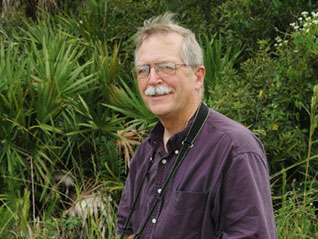
Photographed by Bette Jackson
If you are have difficulty playing the audio click here
Length of Segment: 00:01:15
Hi, I'm Dr. Jerry Jackson, out with the wild things. Because brown pelicans show little fear of humans, it's no surprise that their interactions with us sometimes gets them in trouble. Young brown pelicans improve their fishing skills as they mature and at first take meals wherever they find them. Offering them a leftover bait or fishes too small to keep only encourages them to look to humans for a handout. Don't do it. It can lead to the pelican’s death. A cast by a fisherman is like another free meal to a human-pampered pelican, and the bird can be literally, as well as figuratively, hooked. The skin of the pelican's pouch and the webs of its feet are very vulnerable to tears as a result of snagging. And if a pelican catches a hooked fish, the hook can result in the death of the bird. Discarded monofilament nylon, the plastic rings that hold six-packs of beverages together, plastic bags, and spilled fuel and oil also take a heavy toll on brown pelicans. Efforts to reduce these pollutants can help assure that pelicans won't just be silhouettes against the sunset of old postcards.
'With the Wild Things' is produced at the Whitaker Center in the College of Arts and Sciences at Florida Gulf Coast University. For 'The Wild Things', I'm Dr. Jerry Jackson.< Back to Brown Pelicans
For permissions please contact the owning institution. WGCU Public Media, 10501 FGCU Blvd. S., Fort Myers, FL 33965




